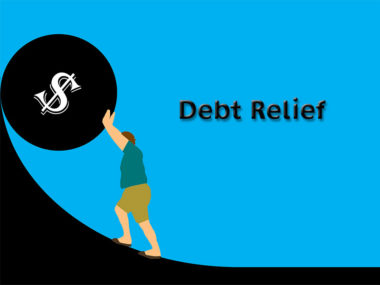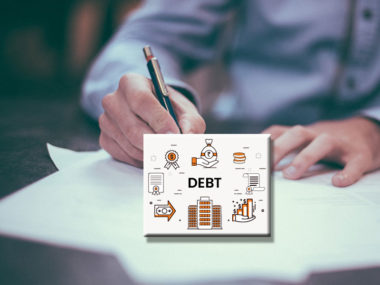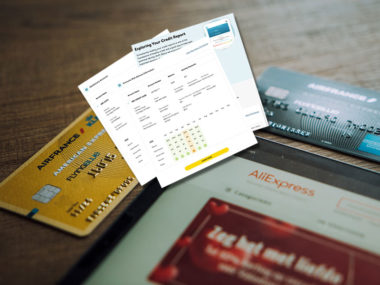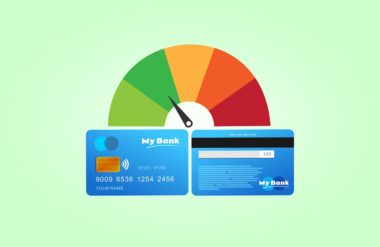Approximately 8 in 10 Americans struggle with debt. Some of these people are victims of identity theft and other forms of cybercrime, but many bear at least some of the responsibility for the debt that they’ve accrued. Between buying a house, paying for college, and handling other expenses for our families, the unfortunate truth is that we are to blame for our debt problems at least some of the time.
This is exactly the sort of debt that can damage your credit score. This fact might scare you, but it doesn’t have to. By learning to accept our share of the responsibility for the debt that we own, we can begin to take the first steps towards overcoming it. When you take responsibility for debt, then you also recognize your ability to change your habits and repair your credit.
However, this is not an easy journey. Admitting fault for almost anything is a difficult thing for anyone to do — it gets even harder when the bills are stacking up in front of you. It can also be difficult to discern where you went wrong. For example, it’s not always a bad idea to take out a loan. In fact, taking on some debt can be a smart and healthy way to handle large expenses. If you find yourself struggling with debt that seems justified, you may need to alter your repayment strategy.
Thanks to the ambiguity surrounding many debt-related decisions, it can be hard to tell when you’re genuinely responsible and, if so, to what extent. Let’s take a look at some common types of debt that many Americans hold, all of which the debt owners are likely responsible for.
Table of Contents
Out of Control Mortgages
Mortgages are a common tool for almost anyone who is buying a new home. In fact, without mortgages the housing economy would be a non-starter. They are a great example of debt that is generally healthy and a necessary part of most of our lives. In fact, keeping up on your mortgage payments is a great way to repair your credit score. However, this doesn’t mean that a mortgage is totally benign. Mortgages can go wrong in a couple of ways, many of which have to do with the behavior and decision-making of the homeowner.
Mortgages Within Your Means
If you are preparing to take responsibility for your mortgage, the first thing to ask yourself is whether or not you bought a home within your means. With the bank’s funds at your back, many people feel more fiscally powerful than they really are. Although a healthy mortgage will allow you to purchase a home that costs much more than the cash you have on hand, it should not exceed the amount of money that you expect to make over the course of your mortgage.
If you’re already dealing with a difficult mortgage, then you probably don’t need advice on the right size of mortgage. What you want to know is what you can do now. If this is your situation, then you have a few options. The first is to sell your house and purchase something that’s within your budget. If you do this, keep in mind that renting may actually be better for you, depending on your exact situation.
On the other hand, you might be satisfied with the home you have. Moving is difficult and costly on its own, after all. Kids might have to go to a new school and you or your spouse could have to find a new job. Moving isn’t always the best option. If your current income isn’t cutting it, it might not be a bad idea to do some freelance work on the side. Freelancing can be a valuable tool until you’re back on your feet.
Problems that Develop Later
Debt can be healthy at the time we take it on, only to become problematic later in our lives when circumstances or the economy changes. In this case it can be had to see what you’ve done wrong. However, there are some things that you can do to fix these debt problems.
First and foremost, it may be time to examine your spending habits. If your spending has increased at a greater rate than your income, then debts that used to be healthy may quickly spiral out of control. The most important thing that you can do now is to take a good look at your spending. What sort of non-essentials are you blowing money on? Things like eating out or shopping more often than you need to can be the first to go if you need to trim your budget down. Cultivating a healthy budget mindset can help you with this.
In some cases it may not be the mortgage-holder’s fault that their payments are going up, but there are still options available to people in these situations. Many people will take on a mortgage with with an adjustable interest rate. Although these rate might start out low, economic conditions can drive it quite high. If this sounds like you, it may be wise to refinance your mortgage to a loan with a fixed interest rate. This is best done when interest rates are low.
Student Loan Debt
Much of the media focus around student loan debt is centered on Millennials who have just recently graduated college. However, the fact of the matter is that Millennials are not the only generation that struggles with college debt. In fact, for those who are still paying of their student loans, the financial responsibilities that come with raising a family and owning a home can only compound their problems.
As with home loans, those who take on debt in order to pay for school should be acutely aware of how much they are likely to make in their chosen career. For many who struggle with student loans, however, this decision is in the past. The immediate question is: what can I do about my student loans now?
As with mortgages, wise spending habits and refinancing are both good tactics to employ. However, there are some additional tricks that apply specifically to student loans. If your student loans are through the federal government, you may qualify for income based repayment, which will significantly decrease your immediate burden if you are facing financial hardship. Student loans may also be eligible for forgiveness. For example, if you take on a teaching job in a low-income community.
Timely repayment of student loans is another great way to repair your credit score if it’s been damaged in the past. Keeping up with these loan payments shows credit companies that you’ve learned how to take responsibility for debt, prompting them to raise your credit score.
Unnecessary Debts
Perhaps the most serious form of self-inflicted debt involves taking on consumer debt for unnecessary purchases. This includes things like taking out loans to pay for a vacation or wracking up charges on a credit card that you can’t keep up with. Whatever the source, this kind of debt is best nipped in the bud. Cutting out bad spending habits and creating a personal budget will help you avoid this kind of debt.
It’s also important to know when enough is enough. Find out how many loans is too many and don’t exceed that amount in your own debt. If you do, you will only end up hurting your credit, making credit repair a necessity later on down the road.
If you’re already receiving bills from credit card companies and having trouble keeping up with loan payments, your options are severely limited. Depending on the severity of your debt, it may be time to call in a professional and seek credit counseling to help mitigate your debt.
Debt Through Negligence
Not all debt that we are responsible for is debt that we’ve knowingly accrued. It may seem strange, but sometimes we share some of the blame when our information is misused to do us financial harm. This can include things like legal identity fraud and risky online shopping habits. It’s wise to keep your financial information well-guarded so that you do not become a victim of financial crime.
I Know I’m Responsible — Now What?
Taking responsibility for your debt is the first step to recovery. It’s hard to admit when we’re at fault, even to ourselves, but it’s also a crucial step towards getting out of debt. Ultimately, knowing is half the battle and knowing how you’re responsible for your debt is the key to knowing what you need to change.
By taking responsibility for your debt, you can break free of the debt cycle. Once you are free, you will still have to live with your past mistakes. Your credit score will likely be affected by your history of debt, however, taking on responsible fiscal habits will help you on the way to repairing your credit. For more information on credit scores, and how debt affects your score, visit our credit score resource and learning center.
Image source: https://pixabay.com/





